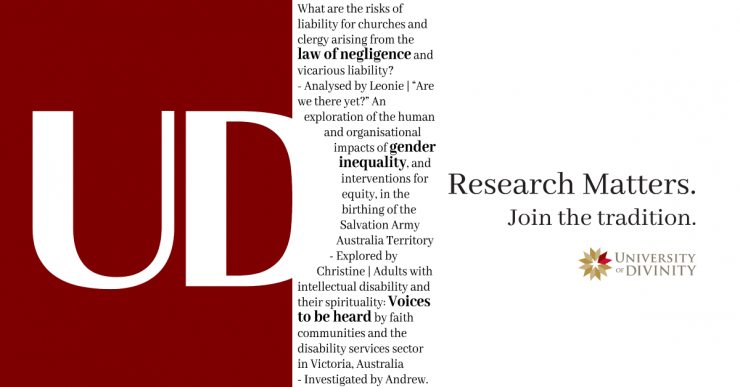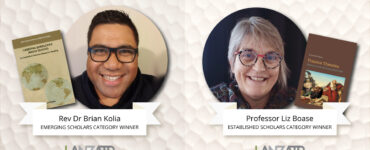Pragmatism runs deep in my veins. I’m an Australian, and an evangelical and a Baptist. Many voices call me away from the academy to engagement with the real world. One voice, perhaps, put it most clearly. My Scottish mother’s. Her acerbic retort when I told her I wanted to do doctoral studies in the intersection of philosophy and Old Testament studies? “Philosophy grows no cabbages!” Some research might be more than a waste of space—medicine, or engineering, or science (my father was, after all, a surgeon and made his contribution to research in trauma surgery). But research in philosophy and biblical studies? Hardly.
Hers, of course, is not the only voice summoning us away from the academy to more practical pursuits. Our government’s funding decisions all-too-clearly show the value it places (only) on research that has direct, obvious, near-term (monetary) economic benefits. Most of our churches, too, (only) care about research that has ‘cash-value’ (so to speak) for their life as a community and their engagement as God’s people in the world. And that’s a problem—at least for someone like me who toils in the cabbage-free fields of philosophy and theology and biblical studies.
Let me be clear. Research that directly and obviously contributes to the flourishing of our communities and our churches is valuable. It’s worth investing in STEM and practical theology and ministry. But why? And how might this, and other kinds of research, be rightly seen as both contributions to human flourishing and expressions of it?
Christian philosopher Nicholas Wolterstorff gives us some helpful leads in answering these questions (which are, after all, theological and philosophical). He distinguishes between praxis-oriented theory, and pure theory. We’ve already talked about the value of praxis-oriented research. But, while it may seem banally obvious, it’s worth a moment’s reflection as to how we understand that value theologically. Research of this kind matters just because, and inasmuch as, it contributes to shalom: to justice, the flourishing of human persons, human communities, and the world in which we live. Of course, that means we need to understand the proper ends of human and creaturely existence, what a justly ordered community looks like. This, too, is part of the work of scholarship, as is the careful interrogation of the ends to which such research might be put. After all, (recent) history is littered with the human and environmental debris of work that seemed to be good, and oriented to good ends, but wound up damaging people and the world we live in. Research matters.
But what about pure research? Now, perhaps ironically, we can see the value of pure research in its pragmatic benefits. Teflon and microprocessors came out of gloriously impractical work in physics. And my own research in the intersections between philosophy, theology and biblical studies has produced unexpected benefits. For instance, my work in theology of medicine has the potential to transform that most practical of enterprises, including how we understand and relate to people with cognitive disabilities.
But pure research also has intrinsic value. The call to ‘name’ (Gen. 2:19) is a call to discernment (as biblical scholarship has demonstrated): to understand what things are and what they are for. And so, it matters that we understand ourselves as humans. It matters that we know God better. It matters that we have a deeper (and perhaps more complex) grasp of the Scriptures through which God summons God’s people to new life. It matters that we understand our heritage and be able to discern the dross and the gold in it. These gloriously useless, purely ‘theoretical’ activities are themselves aspects of shalom, of a rich and flourishing human life. They matter. Research matters.
So, why does research matter? In short: because it is a work of shalom. Research is an opportunity to take up one aspect of our creaturely calling to understand God’s world well and live in it better. Research gives us the chance to see the world clearly and delight in it more deeply and richly. Research provides occasion to recognise the value of the world God has made and the things in it, including our fellow human creatures; both their inherent value as the kinds of things they are, and their instrumental value in the things they are good for, and enable them to fulfil it. Research matters.
And so, despite the siren call of Australian evangelical pragmatism, I hear the voice of God summoning me away from cabbages and to my work in the academy. For I know that my labours in this field of endeavour are not in vain. They matter to God, they matter to God’s mission, and they matter to God’s people. Research is a work of shalom. Research matters.

Reverend Dr Andrew Sloane was appointed Lecturer in Old Testament and Christian Thought at Morling College in 2002. He teaches in the areas of integration of faith and work, OT exegesis (Genesis, Deuteronomy, 1&2 Samuel, Ezekiel, Psalms), OT interpretation, philosophy of religion and bioethics. Andrew qualified in medicine and practiced briefly as a doctor before going into Baptist ministry. Prior to moving to Morling, he taught at Ridley College in Melbourne (1996–2002). He has published in Old Testament and hermeneutics, ethics, philosophy, and theology.







Add comment